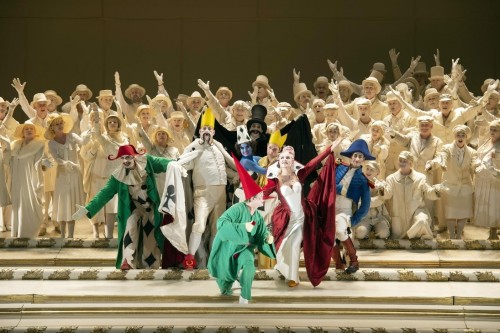 United Kingdom Prokofiev, Die Liebe zu drei Orangen (The Love for Three Oranges): Komische Oper Orchestra and Chorus / Ainārs Rubiķis (conductor), Komische Oper Berlin, 8.12.2018. (JMI)
United Kingdom Prokofiev, Die Liebe zu drei Orangen (The Love for Three Oranges): Komische Oper Orchestra and Chorus / Ainārs Rubiķis (conductor), Komische Oper Berlin, 8.12.2018. (JMI)

Production:
Direction – Andreas Homoki
Sets – Frank Philipp Schlössmann
Costumes – Mechthild Seipel
Lighting – Franck Evin
Cast:
Prince – Thomas Blondelle
Princess Ninetta – Mirka Wagner
Fata Morgana – Svetlana Sozdateleva
Truffaldino – Ivan Turšić
King – Jens Larsen
Celio/Cook – Philipp Meierhöfer
Leander – Günter Papendell
Princess Clarice – Maria Fiselier
Smeraldine – Karolina Gumos
Pantalone – Dominik Köninger
Farfarello/Herald – Samuli Taskinen
Princess Linetta – Marta Mika
Princess Nicoletta – Georgina Melville
It is always a pleasure to attend a performance of this opera, a fairy tale accompanied by great music. I saw the Komische Oper production (which is sung in German) five years ago, but found it even more convincing this time in terms both of musical direction and vocal cast.
The Andreas Homoki staging has become a classic in this theater and traveled successfully to opera houses in other countries. A colorful, attractive production, it tells the story with a sense of humor and plenty of touches that appeal to children (of whom there were many in the audience). The sets make good use of props like giant storybooks, oranges and animals, and the costumes are lively and amusing. The stage direction is also very good, especially in terms of the chorus, and the artists perform without any kind of reservation. It all makes for a funny, unpretentious show, and the spectators have a delightful time.
Ainārs Rubiķis, Music Director of the Komische Oper, led a remarkable performance by the orchestra and chorus. Two months ago, I was impressed by his conducting of Die tote Stadt (review click here), and he fully confirmed the positive opinion I had formed.
On this occasion, tenor Thomas Blondelle gave a compelling performance as the Prince. He has an attractive voice and is very comfortable on stage. Good too was tenor Ivan Turšić in the part of Truffaldino, the Prince’s companion in his adventures, who handles his voice very nicely.
Fata Morgana was played by soprano Svetlana Sozdateleva; she sang well and was a good comedian. Her companion, Celio, was well interpreted by the bass Philipp Meierhöfer, who doubled as the Cook in the Palace of Creonte. Repeating the role from five years ago, soprano Mirka Wagner was again a convincing Princess Ninetta.
The sonorous bass Jens Larsen as the King was well-suited to the role, as were the intriguing pair formed by Günter Papendell (Leander) and Maria Fiselier (Princess Clarice). Dominik Köninger did well in the part of Pantalone, the king’s advisor, and so did Karolina Gumos as Smeraldine, the assistant to the Fata Morgana. Samuli Taskinen was an amusing Farfarello, and both Georgina Melville (Princess Nicoletta) and Marta Mika (Princess Linetta) were good in their brief appearances.
The theater was almost sold out, and the behavior of the remarkable number of children was exemplary throughout the performance. The artists were warmly received in the final bows.
José M. Irurzun
